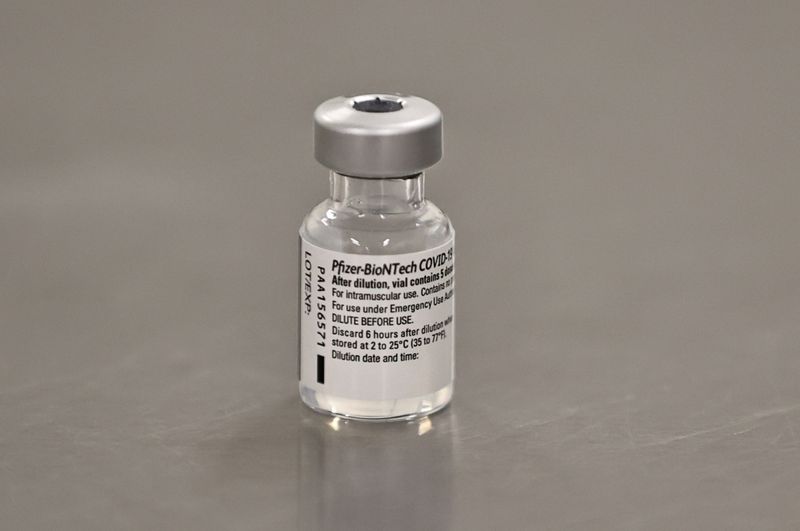OTTAWA (Reuters) - Canada on Wednesday approved the first COVID-19 vaccine, jointly developed by Pfizer Inc (NYSE:PFE) and its German partner BioNTech SE, and is now preparing to distribute early doses to the most vulnerable groups.
Managing the nationwide rollout will be one of the most complex logistical undertakings in the country's history, officials say.
WHEN CAN CANADIANS EXPECT TO BE VACCINATED?
Prime Minister Justin Trudeau told the House of Commons on Wednesday that Canada would receive 30,000 doses next week and up to 249,000 by the end of the year.
Only a handful of provinces have so far detailed their immediate plans. Saskatchewan said it expected to receive Pfizer vaccine for 1,950 people by Tuesday, and would use it to inoculate healthcare workers caring directly for COVID-19 patients. Neighboring Manitoba said it expected enough Pfizer vaccine next week to immunize 900 healthcare workers.
General immunization for all 38 million Canadians will begin in April 2021 with a goal of 100% coverage by the end of the third quarter, Health Canada said in a document.
WHO WILL RECEIVE THE FIRST DOSES?
Officials say priority groups such as healthcare workers, employees in long-term care homes, vulnerable members of the elderly population and those living in remote Indigenous communities will receive vaccines first.
HOW WILL VACCINES BE TRANSPORTED AND TO WHERE?
Provincial orders for vaccines will be coordinated through a national operations center with help from the military.
Pfizer's ultra-low temperature vaccine will be transported by the manufacturer directly to the 14 points of inoculation that Ottawa has set up across the country.
The federal government has contracted FedEx Corp (NYSE:FDX) and Innomar Strategies, a Canada-based division of AmerisourceBergen (NYSE:ABC) to provide logistical support on vaccine delivery.
Frozen vaccines, like Moderna's, will be transported by federally contracted logistics service providers from where they are manufactured to set points of delivery.
Canada is now running distribution drills to ensure that critical capability gaps are filled, risks are mitigated, and contingencies are put in place.
WHICH OTHER VACCINES ARE IN THE APPROVAL PROCESS
Canadian officials say the next regulatory decision will be on Moderna Inc's candidate vaccine. Canada also has agreements to purchase the potential vaccines of Novavax Inc, Johnson & Johnson (NYSE:JNJ), Sanofi (PA:SASY) SA with GlaxoSmithKline Plc, AstraZeneca Plc, and Medicago.
If all were to receive regulatory approval, Canada could buy enough doses to vaccinate the country more than five times over.
Canada expects the first 6 million doses from Pfizer and Moderna Inc to arrive in the first quarter of 2021, enough for 3 million of the 38 million population.
WHO WILL BE IN CHARGE OF ADMINISTERING VACCINES TO PEOPLE?
Health authorities in the provinces and territories are responsible for determining how vaccines will be deployed and on administering them to their populations. Inoculation will be free.

Ontario, Canada's most populous province, has also set up a task force headed by Canada's former Chief of the Defence Staff Rick Hillier.